Introduction
Media bias, whether real or “perceived”, is so extensive it spawns an industry of sorts researching the different shades of bias and ideology that afflict industry. It is a problem nearly as old as the free press in America.
Media owners have never been reticent about promoting their own interests or the political ambitions of allies. Even in the era of the Founding Fathers, no less than the widely-respected and sagacious Benjamin Franklin thought nothing of writing under a pen name in a 1728 issue of the American Weekly Mercury that the government ought to print more paper money. Perhaps no one yet understood that doing so would be inflationary. Of course, Benjamin Franklin neglected to mention that the printing company he owned was in the running to get the job of printing the money if the plan was approved (Isaacson, 2004, 61).
In print and broadcast media, the proliferation of media choices was impelled in part by those who wished to propagate their own ideology in opposition to the sole entry in the city.
As to ideology, there is no lack of respectable content-analytical research (e.g., Weatherly, J. A. et al., 2007, 97) revealing that:
- Liberals are disproportionately represented in the ranks of American broadcast and press staff.
- They espouse more liberal views than the American public does with respect to such “hot button” issues as abortion, affirmative action, welfare reform, environmental activism, gun control and homosexuality.
- By and large, they are not reticent about letting their liberal views color news reporting.
The Open Hand Extended to Iran
On the occasion of the Iranian New Year, Mr. Obama released a videotaped greeting ostensibly addressed to the Iranian people. The message was couched in terms of a promise to negotiate an easing of trade sanctions Iran is still subject to if the implacably hostile nation could be more responsible in its foreign relations stance (Savin, 2009, 1).
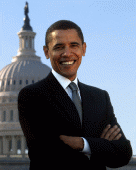
Mr. Obama said he wished to directly participate in international talks with Iran over its nuclear activities. He praises the Iranian contributions to culture. But his main thrust was to ask the Iranian people for renewed exchanges amongst the peoples, for partnership and commerce in the hopes of ending the divisions in the world (Djang, 2009, 1).
The full text: “On the occasion of your new year, I want you, the people and leaders of Iran, to understand the future that we seek. It’s a future with renewed exchanges among our people, and greater opportunities for partnership and commerce. It’s a future where the old divisions are overcome, where you and all of your neighbors and the wider world can live in greater security and greater peace.”
The message was made on March 19 on the occasion of Nowruz or the Persian new year and was addressed to the “Islamic Republic of Iran”. He admonished them to respect “the common humanity that joins us together.”
This announcement was well received and supported by his cabinet who believed that there is a need for Iran to abandon its efforts to obtain a nuclear weapon
This is also obviously an effort to re-open diplomatic channels, veer away from the hostility that had marked bilateral relations since the Iranian revolution of 1979, and reverse the Bush rhetoric that asked Iranians to rise up against their government.
American media has itself shown a kind of bias in not subjecting Mr. Obama to any criticism when he remained silent for an entire week after street demonstrations erupted in Iran. From all across the liberal, centrist and conservative spectrum of political ideology, the American press turned itself into spin masters for the positive turnaround in the recession now that a new President was in the saddle. Uncharacteristically, reporters became willing mouthpieces for each new policy initiative espoused by the new Administration. America remained under a cloud of sluggish economics and pessimism but you would not know it from headlines that blared, “Recession slowing down, only 650,000 more jobless last month!”
Farideh Farhi, a prominent commentator on Iran-US affairs, ( Informed Comment: Global Affairs believes the speech would do much to amend the prevent controversy in Iran. First and foremost it was the first speech out of Washington that was not openly trying to divide the people of Iran from its government. No more we love the people of Iran but hate their government taunts repeatedly brandished by the Bush Administration. Second, it was not trying to drive a wedge between the leaders of Iran. Third, he was committed to “engagement that is honest and grounded in mutual respect”. Farhi notes that this is the closest the US has come to rule out a military option.
Iranian Reaction
For its part Iran has been unwilling to reciprocate this stance. Iranian policy in reaction to the United States can be summarized by “extend a hand if you are willing to unclench your fist”. This stance is not surprising in light of the hard-line stance of Iranian President Mahmoud Ahmedinejad. At best the Tehran government claims it will cooperate in the event that President Obama’s stance is indeed honest.
While the President of Iran was skeptical at best, former Iranian vice president Mohammad Ali Abtahi was more optimistic he said;
Using the title of “Islamic republic of Iran” and (conveying) also congratulations to the Iran’s nation and leaders. Undoubtedly it is a historical opportunity. We can not ignore the importance of USA for Iran’s current situation. Undoubtedly we can not ignore trace of US leaders in all of Iran’s dossiers also at least in economical aspect by embargos which have imposed to Iran’s nation. Sending message for congratulation can be the most important political, economical and historical opportunity, today and after changing American government. Also ignoring that can make a situation for us more dangerous than Bush’s term because Obama can mobilize political leaders and public opinion against Iran. (Webnevesht)

More recently, it is clear that Mr. Ahmadinejad and the shadowy Guardian Council still show no inclination to meet the American initiative even partway, presumably out of fear that concessions will mean a more open, secular nation secure in its own right. To Western media and diplomatic circles, Iranian intransigence is clear from the prickly attitude toward criticism about the handling of protests following the Iranian Presidential elections this month (about which more is discussed in section D below).
Nor can we fault media for reporting how Mr. Ahmadinejad lashed back at President Obama for speaking up: “…I wonder why Mr. Obama, who has come with the slogan of change, has fallen into this trap, the same route that Mr. Bush took and experienced its ending… This will not have any result, except that the people will consider you similar to Bush.” (Cummins, 2009, 1). For the Iranian theocracy to try and influence American opinion by tarring Mr. Obama with the same brush used to blacken Mr. Bush in his time is bound to fail. The American body politic is instinctively resistant to undemocratic government, no matter what ideology, race or religion it represents.
From the viewpoint of the nuclear powers, it is doubtless a laudable goal to forestall development of the Iranian bomb. Nuclear weaponry quite simply adds to the instability of a region where terrorists run loose, where religion is used as an excuse to kill innocents and the prospect for conflict is always around the corner.
September 11 and the Tide of Public Opinion
The destruction of the Twin Towers in New York was a watershed in the history of American national security. For the first time, Muslim Arabs had not only succeeded with a hugely murderous terrorist attack, their confederates in al Queda gloated about it and made their satisfaction known to the world. The event was tectonic in impact. This complacently tolerant society now shifted towards fear and loathing towards those of Arab or Muslim identity who lived as their neighbors and colleagues at work. In defense, America permitted every infringement of privacy and civil liberties to the larger benefit of security for all. The United States also lashed out at enemies wherever they lived and sought to hide. Military action in Iraq and Afghanistan followed and lasted to this day.
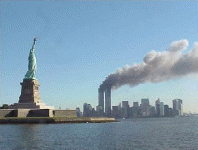
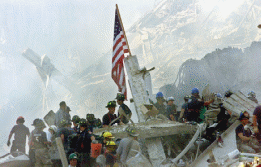
In the aftermath of 9/11, the items of media coverage that provoked the most outrage were depictions of Palestinians and Arabs elsewhere celebrating the Twin Towers attack.
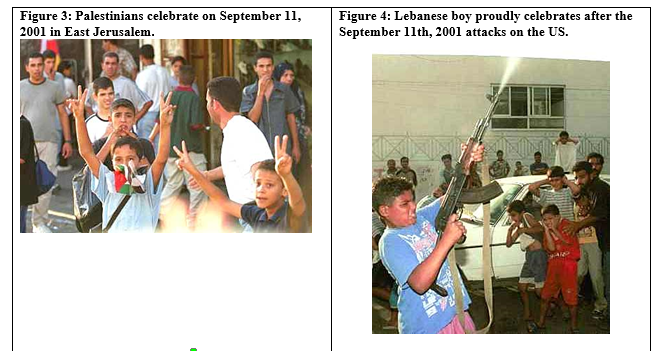
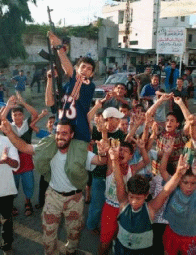
Decent folk everywhere responded with dismay and shock at the coverage of workers in the WTC falling to their deaths, some actually jumping off to escape what must have been fearsome fire and smoke.
The picture alongside made it clear to Americans that Arabs considered themselves at war with the U.S.A. Nor can the press escape responsibility for the distortions they create. The shot in the preceding page is captioned Palestinians when the reality is that the photographer captured two naïve boys and made them represent all Palestinians in the Holy City. This is akin to CNN spotlighting injury, destruction and, yes, death in the Gaza Strip while consistently choosing to ignore the many Jewish fatalities of Palestinian/Arab rocketry and ambushes.
The press can disavow bias and indeed, what they depict can objectively be accorded a truth that might salve their conscience for being such selective journalists. But reality is what readers and TV audiences perceive of the world media brings to their living rooms. In the classroom, students readily equated the celebrating Palestinians shot as “evidence” that the press immediate identified Arabs as the people responsible. for the Twin Towers tragedy.
The press can be claimed for ignorance and oversimplification. Not all Arabs are fundamentalist radicals/al Qaeda terrorists; Iranians are Persians technically of Aryan stock. But both races are Muslim anyway, they talk, hate and pray in similar fashion. So again, reality is blurred.
Similarly, not all Muslims are terrorist supporters. Or is it mere coincidence that terrorist camps or weapons caches have been found in the West Bank, Lebanon, Saudi Arabia, Afghanistan, Indonesia, Malaysia and Muslim enclaves in the Philippines and Thailand? Is not media itself mistaken in automatically bringing up the fact that terrorist groups like al-Qaida are Muslim? Yes, their apologists claim that al-Qaida is made up of “thugs and gangsters whose actions are contradictions of everything that Muslims believe and practice” (Craig, 2001, E3). But can the American public be blamed for their perceptions when they occasionally see terrorist leaders quoting the Koran to justify annihilation of Jews and all other “non-believers”?
The Turbulent Aftermath of the Iranian Election of 2009
In general, the role of American media in the Iranian presidential elections held on June 12 has been frankly skeptical about the chances of free and fair elections in a society ruled by “theocracy”. The current tempestuous stand-off – incumbent President Mahmoud Ahmadinejad declared the winner by a 62.6% to 33.75% margin over opposition candidate Mr. Hossein Mousavi – may be characterized as a self-fulfilling prophecy. After all, reportage in the run-up to the election tended to describe the campaign and polling as “turbulent” given the expectation of outsiders that Mr. Mousavi stood a good chance of unseating Mr. Ahmadinejad.
Such an adversarial attitude towards the incumbent is compounded of many factors. There is religion, first of all. To Americans whose Constitution so enshrines separation of church and state that schoolchildren learn nothing of religion in the classroom, it is utterly mystifying why any “Islamic Republic” would wish to rule the lives of its citizens and mete out justice according to the decidedly medieval rules of the Quran. Even Israel, founded eons ago based on a covenant with Yahweh and re-established in modern times as a haven for those fleeing religious persecution, is governed as a secular state.
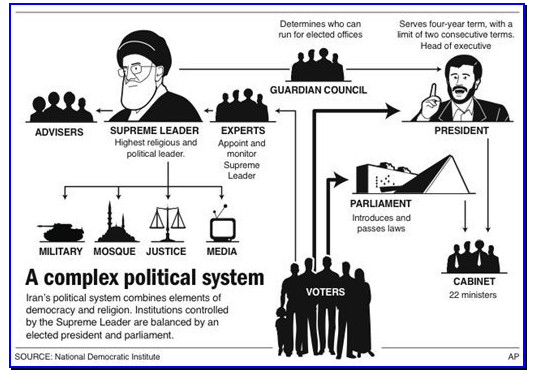
Secondly, Iran and the U.S. have a history of bruised feelings. It was the Allies who installed Reza Pahlevi as “shah” at the conclusion of World War II. Successive U.S. Presidents stood by the Shah’s increasingly despotic rule because they needed a southern “bulwark” against Russian expansionism. It was therefore easy for the only focal point of resistance, religious authorities, to foment revolution, send the Shah into exile and provoke ill will against “The Great Satan” as a distraction from a backward economy. Two generations of American politicians cannot forget the huge embarrassment they suffered when Ayatollah Khomeini allowed the Islamic Revolutionary Guards to run rampant and hold the U.S. embassy in Tehran hostage for 444 days (Kinzer, 2008, 68).
While Iranians are not Arab, thirdly, they have sided with their fellow Muslims in rejecting Jews and the very existence of Israel. To an America steeped in Judeo-Christian traditions, support for the continued existence of the Holy Land is virtually non-negotiable. In fact, U.S. foreign policy in this respect has weakened slightly only when OPEC holds the world hostage to an oil embargo. On the part of Israel, there is no love lost for a nation that switched from secret ally during the time of Shah Pahlavi to the modern-day supplier of rockets to Hezbollah and Hamas. It does not help either that just under half of today’s Israeli population have vivid memories of being expelled by their Arab host nations when Israel won the War of Independence in 1949 and two other wars that followed (Aharoni, 2002, 1).
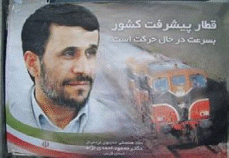
Exactly a fortnight after election day, reports on the situation in the ground have by no means been halted by the government’s decision to expel selected diplomats and foreign correspondents and order all the rest under virtual house arrest in their Tehran residences and hotels. Far too many opposition partisans act as willing sources for reporters burning the long-distance telephone lines; or else, they find ways to transmit pictures and video. And nobody in the Iranian high Council anticipated that, with street demonstrations effectively banned, Mr. Mousavi would put up his first-ever statement about the post-election situation on his own Web site.
This stance of the fearless political lone wolf defying a “repressive” government evokes images of Horatio at the bridge, Ulysses braving long odds to make it home to Penelope, the town sheriff in the old West staring down unsavory gunslingers and consequently plays well to American and European audiences. Reporters instinctively side with opposition politicians who dare to oppose dictatorships such as those of the imams in Iran, the junta in Burma, Ferdinand Marcos of the Philippines, or Anastasio Somoza in Nicaragua.

As it is, Western media must now rely on reports from those in opposition to the current Iranian government. Hence, even the fairly even-handed Wall Street Journal (Cummins, 2009, 1) makes use of smuggled-out photos as evidence of repression of First Amendment rights (see alongside and overleaf). The latest reportage below puts pictures of elements of the Iranian military and militia “above the fold” so as to highlight the heavy hand of a government intolerant of citizens exercising their right to free speech and expression of legitimate grievances.
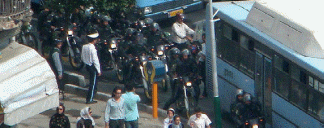
Every single story in American and European wire services has given credence to the opposition claim that the elections were attended by “massive fraud.” WSJ editor Chip Cummins and the Associated Press paint a sordid picture with news copy like:

- “Iran Cracks Down on Mousavi Allies” to prepare the reader for details about a government repressing democratic rights.
- The situation is bluntly portrayed as “…domestic unrest — the worst since the Iranian revolution 30 years ago…” and “…government attempts to silence dissent,” an unforgivable political transgression to everyone in Western media.
- “President Mahmoud Ahmadinejad accused President Barack Obama of meddling in Iran’s affairs”, at which a Western reader might wonder, “how can any right-thinking reader believe that an American leader half a world away (and struggling with economic problems to boot) has anything to gain by fomenting unrest for no good reason in Iran?”
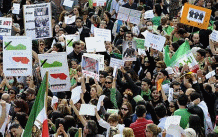
- Reporters can be mercilessly biased in seizing on even minor sidelights to the situation in Iran. No one can say for sure how many have been killed, injured or arrested in the two weeks since election day but American media throws up its collective arms in mock horror at the revelation that 70 professors have been jailed just for daring to meet with Mr. Mousavi.
- News reports also gleefully seize on the fact that support for Mr. Ahmadinejad even within his own Parliament may have eroded, as witness Tehran newspapers stories that ”85 out of 290 members of parliament, including Speaker Ali Larijani” were notably absent from Mr. Ahmadinejad’s victory celebration.
- Iranian security forces are portrayed as trigger-happy and all too ready to wield clubs on even small gatherings. At the same time, they are held up for ridicule because “…eight members of the pro-government Basij militia (also scorned as “the baton-wielding rent-a-mob who are the clerical regime’s unofficial enforcers”) were killed and dozens more wounded by weapons and knives” (McDowall and Freeman, 2009).
- On Iranian state TV, Mr. Khamenei was reported as blustering at a meeting of senior parliamentarians that “Neither the system nor the people will give in to pressures at any price.” This was, of course, after he had already proclaimed the election results official while offering no proof to weaken opposition allegations of massive fraud.
- And Mr. Mousavi is, course, painted in a completely favorable light with news copy like, “…but he vowed to persevere with his election challenge despite the apparent attempt to isolate him from his supporters.”
Conclusions
The trickle of Persians and Arabs who have immigrated to the U.S.A. aside, there is no ignoring the cultural and religious antagonism that exists between America and certain Muslim nations. This sustains self-interest and bias on both sides even though one concedes there are media thought leaders who strive for evenhanded reporting without vitriolic comment.
References
Aharoni, A. (2002). The forced migration of Jews from Arab countries. Historical Society of Jews from Egypt website. Web.
Craig Jr., J. G. (2001). Distinctions and indifference, belief in media bias withstands evidence to the contrary. Pittsburgh Post – Gazette. Pittsburgh, Pa.: pg. E.3.
Cummins, C. (2009). Iran cracks down on Mousavi allies. Wall Street Journal News Roundup: Middle East News. Web.
Djang, J. (2009). A new year, a new beginning. Web.
Isaacson, W. (2004). Benjamin Franklin: An American life. New York: Simon & Schuster.
Kinzer, S. (2008). Inside Iran’s fury. Smithsonian.
McDowall, A. & Freeman, C. (2009). Iran election: how a week of protest has changed Islamic state for ever. The UK Telegraph. Web.
Slavin, B. (2009). Obama sends Iran new year’s greeting. The Washington Times. Web.
Weatherly, J. A. et al. (2007) Perceptions of political bias in the headlines of two major news organizations. The Harvard International Journal of Press/Politics, 12 (91): 97.